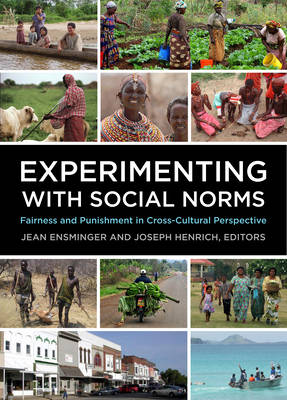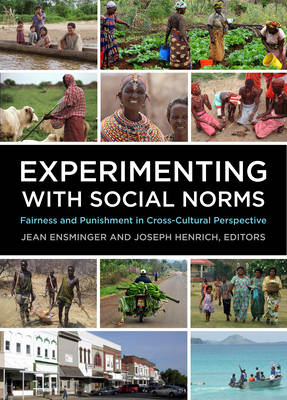
- Retrait gratuit dans votre magasin Club
- 7.000.000 titres dans notre catalogue
- Payer en toute sécurité
- Toujours un magasin près de chez vous
- Retrait gratuit dans votre magasin Club
- 7.000.0000 titres dans notre catalogue
- Payer en toute sécurité
- Toujours un magasin près de chez vous
Experimenting with Social Norms
Fairness and Punishment in Cross-Cultural Perspective
60,95 €
+ 121 points
Description
Questions about the origins of human cooperation have long puzzled and divided scientists. Social norms that foster fair-minded behavior, altruism and collective action undergird the foundations of large-scale human societies, but we know little about how these norms develop or spread, or why the intensity and breadth of human cooperation varies among different populations. What is the connection between social norms that encourage fair dealing and economic growth? How are these social norms related to the emergence of centralized institutions? Informed by a pioneering set of cross-cultural data, Experimenting with Social Norms advances our understanding of the evolution of human cooperation and the expansion of complex societies. Editors Jean Ensminger and Joseph Henrich present evidence from an exciting collaboration between anthropologists and economists. Using experimental economics games, researchers examined levels of fairness, cooperation, and norms for punishing those who violate expectations of equality across a diverse swath of societies, from hunter-gatherers in Tanzania to a small town in rural Missouri. These experiments tested individuals' willingness to conduct mutually beneficial transactions with strangers that reap rewards only at the expense of taking a risk on the cooperation of others. The results show a robust relationship between exposure to market economies and social norms that benefit the group over narrow economic self-interest. Levels of fairness and generosity are generally higher among individuals in communities with more integrated markets. Religion also plays a powerful role. Individuals practicing either Islam or Christianity exhibited a stronger sense of fairness, possibly because religions with high moralizing deities, equipped with ample powers to reward and punish, encourage greater prosociality. The size of the settlement also had an impact. People in larger communities were more willing to punish unfairness compared to those in smaller societies. Taken together, the volume supports the hypothesis that social norms evolved over thousands of years to allow strangers in more complex and large settlements to coexist, trade and prosper. Innovative and ambitious, Experimenting with Social Norms synthesizes an unprecedented analysis of social behavior from an immense range of human societies. The fifteen case studies analyzed in this volume, which include field experiments in Africa, South America, New Guinea, Siberia and the United States, are available for free download on the Foundation's website: www.russellsage.org.
Spécifications
Parties prenantes
- Editeur:
Contenu
- Nombre de pages :
- 492
- Langue:
- Anglais
- Collection :
Caractéristiques
- EAN:
- 9780871545008
- Date de parution :
- 01-10-13
- Format:
- Livre broché
- Format numérique:
- Trade paperback (VS)
- Dimensions :
- 165 mm x 231 mm
- Poids :
- 340 g

Les avis
Nous publions uniquement les avis qui respectent les conditions requises. Consultez nos conditions pour les avis.





